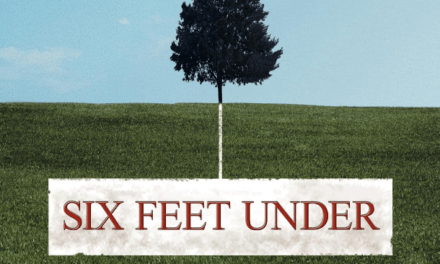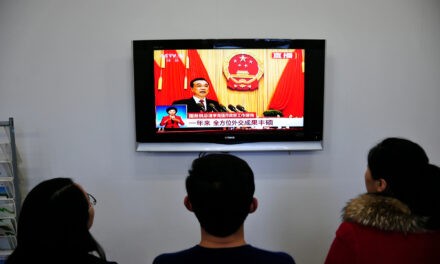There has been plenty of discussion on this blog and elsewhere about the difficulty that many of us have as television scholars ‘keeping up with television’. It’s certainly something that comes up repeatedly as a topic of conversation in meetings of the Midlands Television Research Group. As the group has been asked to take a regular slot in the CST Blog schedule, I thought by way of an introduction, I’d offer some observations about the group, and particularly the process of watching television together in the context of a research group, as opposed to within social or domestic environments (the importance of which Lorna Jowett has written about excellently here).
Based at the University of Warwick, and currently including members from the Universities of Warwick, Birmingham City, Lincoln, Leicester and De Montfort, the Midlands Television Research Group has been running termly meetings since 1995. Each time we meet we discuss a particular piece of reading (or readings) related to the study of television and share our developing research interests and work-in-progress. There have also been a number of group research projects, the most recent of which was blogged about here.
However, one of the most interesting point on any agenda is unofficially titled ‘What we’ve been watching’, and simply involves a couple of people per meeting bringing in extracts of programmes that they have found interesting, and then watching and discussing them as a group (towards the end of the meeting, usually after 6pm). Perhaps unsurprisingly, this item regularly encourages the most vibrant discussions, and the experience of actually watching television after an afternoon talking television offers a (perhaps ironically) novel approach to thinking about television as a group.
The range of material that has been viewed is eclectic, to say the least. Recent meetings have seen us discussing the use of Patois in children’s television (thank you Rastamouse), exploring the post-feminist sensibilities of Gossip Girl; thinking about the dual address of Horrible Histories and its place within public service broadcasting; balking at the strained relationship between history and entertainment in American Digger; and debating the importance of place in Peaky Blinders.

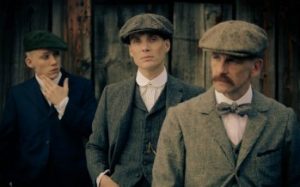
The choices are entirely personal, usually come prefaced with a short introduction, and can frequently tell us a lot about what we have, and have not been watching. At a fundamental level, the choice of programmes tends to stem from one of two places: interesting things that we’ve viewed for pleasure/leisure by ourselves or with our partners, children, friends or families (the most frequent); something that we’re working on and want the views of others (much less frequently). In either case there are usually personal reasons for making the selection, as well as a general enjoyment from the rest of the group of watching something that we might not otherwise have seen.
The experience of viewing and discussing programmes in such a way is always a helpful reminder of why Television Studies matters. We aren’t selecting viewing based on aesthetic judgements or culturally oblique and notoriously flexible notions such as ‘quality’, nor are we viewing what is popular. Instead we are simply sharing what we like, dislike or find interesting in our daily viewing. In essence we find ourselves offering up the moments at which our personal viewing of television within the everyday structures of daily life brush against our interest in television as a scholarly object; perhaps, even, those moments when ‘leisure’ becomes ‘work’.
This relatively unstructured approach to what we watch forms the majority of our viewing at group meetings. However, we have at times felt obliged to discuss certain important and unfolding televisual ‘events’. These programmes, therefore, form a sort of intervention into the more ‘freewheeling’ choices that surround them, and occasionally offer up an alternative perspective on our own practices as viewers and scholars. Three relatively recent examples of wider cultural discussion structuring the programming of our meetings were the Royal Wedding, (the BBC’s response to) the Jimmy Savile scandal and the furore surrounding Benefits Street, and we watched some of the BBC’s wedding commentary, BBC news coverage of the announcement of George Entwistle’s resignation and a section from the Channel 4 show Benefits Britain: The Live Debate in those respective meetings.
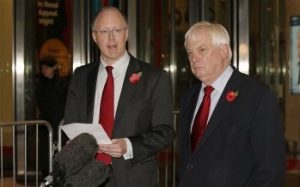
Two related things were striking about these viewing experiences. Firstly, was the feeling that we felt obliged to engage (as scholars) in debates about television that were raging in the press, the media and in wider public life – it was important to discuss these things because other people were discussing them. The conversations that arose, therefore, came out of a feeling of obligation, rather than as a spontaneous moment derived primarily from the viewing of television for leisure.
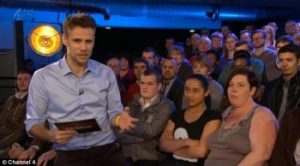
The second observation was that when it came to Benefits Street only a small number in the group had actually seen any of it. And even some of those people (myself included) had searched it out because we knew in advance that it was on the agenda – as convenor, I was preparing the introduction. For that week, then, ‘What we’re watching’ became something more akin to ‘What everyone else is talking about, so we’d better watch some of it too’. The discussion was interesting, and fruitfully highlighted the way the programme’s status as television had been frequently excluded from the debate, despite the best efforts of the participants to articulate this (something that Helen Wood has addressed here). But what we continually returned to was the fact that very few of us had watched something that had seemed to have quite an explosive impact on British culture. From a personal perspective – one shared by at least some in the group – the key reason for having not seen Benefits Street was that the visibility of the programme’s impact already made watching it feel like ‘work’, and so viewing it in leisure time was actively avoided.
Such interventions into the ordinary flow of the ‘What we’re watching’ section of the group’s agenda, therefore, turn the usual process of group viewing on its head. Rather than sharing something of personal interest with the group, the activity becomes a site where we are able to collectively catch up with (or plug ourselves into) a wider cultural phenomenon that is going on outside our spheres of personal or academic interest. It becomes a way of identifying what we’ve missed that’s important and bringing ourselves up to speed as a group. It goes without saying that with so much television out there, you can’t see everything, even if it’s important to other people.
These incidents have also affirmed the continued importance of television as a cultural for(u)m. In the continued discussion of boxsets, timeshifts and on-demand, programmes such as Benefits Street and its live follow-up debate(s) demonstrate that the general public’s engagement with television that is on ‘now’ – even if that ‘now’ stretches a little way beyond the immediate moment of broadcast – is still an important aspect of our media and cultural landscape. The fact that the group (as scholars) feel the urgency to engage at all with such televisual events is testament to the fact that broadcast television remains an important aspect of the wider population’s cultural, social and political lives. Such viewing exercises might disrupt the flow of the Midland Television Research Group’s regular journeys into our own personal viewing selections, but such examples – through their public exposure – continue to reaffirm the importance of, and need for,Television Studies, and by proxy legitimate the more typical discussions of Rastamouse and Gossip Girl etc. that we find so interesting.
Richard Wallace is a Research Fellow in the Department of Film and Television Studies and the Institute of Advanced Study at the University of Warwick. He is currently teaching a number of television courses in the department and is due to begin a research project exploring the role of cinema projectionists in Britain. He has been a member of the Midlands Television Research Group since 2009, and convenor since 2012.



